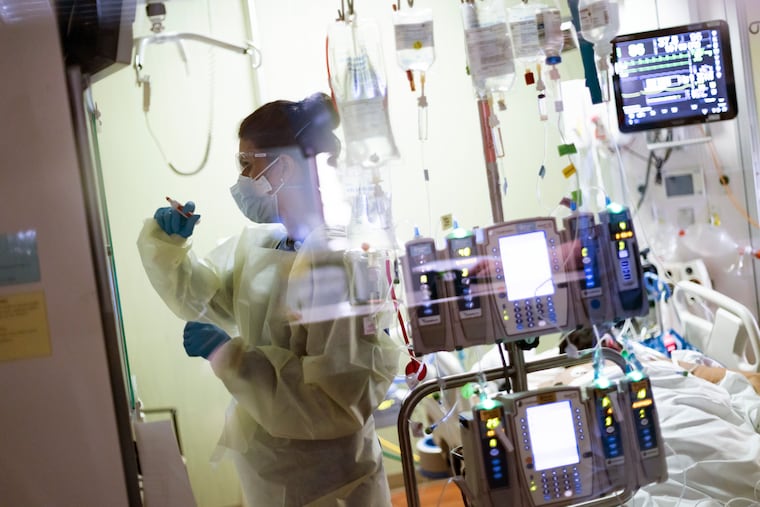COVID-19 hospitalizations for unvaccinated patients total $5.7 billion in ‘avoidable’ costs, study finds
Unvaccinated people cost the health system $5.7 billion in avoidable hospital expenses between June and August, according to new analysis by the Kaiser Family Foundation.

Unvaccinated individuals cost the U.S. health-care system $5.7 billion in avoidable hospital expenses over the last three months — a tab that could continue to rise as vaccination rates plateau and cases surge among the unvaccinated.
In August alone, COVID-19 hospitalizations among unvaccinated people cost $3.7 billion — more than the prior two months combined — according to new analysis by the Kaiser Family Foundation. The estimate does not include the cost of follow-up care or long-term medical needs.
“The monetary cost of treating unvaccinated people for COVID-19 is borne not only by patients but also by society more broadly,” Krutika Amin, an associate director at the Kaiser Family Foundation, and coauthor Cynthia Cox, a vice president at the organization, wrote in their analysis.
Using data reported to the U.S. Department of Health and Human Services and the Centers for Medicare and Medicaid Services, Amin and Cox estimated that 280,000 adult COVID-19 hospitalizations between June and August could have been prevented if people had gotten vaccinated. While breakthrough cases among vaccinated individuals can occur, the vast majority of COVID-19 hospitalizations have been among people who were not fully vaccinated.
» READ MORE: For long COVID-19 patients with brain fog and other neurological symptoms, a Penn program seeks answers
The Pennsylvania Department of Health on Tuesday said that unvaccinated people account for 95% of hospitalizations and 97% of deaths.
“The data that we have is showing once again that even as the more transmissible delta variant becomes more widespread, the COVID vaccines are safe, are effective, and help prevent serious illness and death,” acting Health Secretary Alison Beam said at a Tuesday news conference.
The shots can also help prevent rampant medical costs, according to Kaiser Family Foundation’s analysis.
The cost of a COVID-19 hospitalization could vary widely, depending on the length of stay and whether a ventilator was needed. Researchers assigned each hospitalization a price tag of $20,000, based on reported rates Medicare has paid for COVID-19 hospitalization, and other studies that sought to estimate costs among privately insured COVID-19 patients.
Since the beginning of the pandemic, taxpayer-funded public programs, such as Medicare and Medicaid, and private health insurance have picked up a majority of the bill. Pandemic relief bills have created pools of money from which hospitals can recoup expenses for treating uninsured COVID-19 patients.
Most patients have been spared the brunt of COVID-19 hospitalization costs, but that could change.
As the pandemic drags on much longer than most anticipated and vaccines become widely available, many health insurers have begun rolling back their early pandemic policies of covering COVID-19 treatment in full.
» READ MORE: Can life insurance companies charge the unvaccinated higher premiums? 5 questions answered.
Independence Blue Cross, the largest insurer in the Philadelphia area, said it would continue to cover COVID-19 hospitalization at in-network medical centers for private-plan members through the end of October. Treatment after they are released from the hospital, such as skilled nursing, rehabilitation, and prescriptions, is subject to the plan’s cost-sharing rules.
The insurer’s Medicare Advantage plans will cover in-network and out-of-network COVID-19 hospitalization for the duration of the public health emergency.
High COVID-19 costs could also affect insurance premiums. Under the Affordable Care Act, insurers are not allowed to charge higher premiums to people who are unvaccinated, which means the bill racked up by unvaccinated individuals is shared by everyone.
So far, early rate filings do not show a big increase in premiums, in part because lower-than-expected routine care costs neutralized the cost of COVID-19 treatment, Amin said. After health systems temporarily suspended nonemergency surgeries and procedures in the first half of 2020, insurers expected a surge in this type of medical expense, but that did not happen, she said.
Meanwhile, the COVID-19 vaccines will remain free for everyone — even those who are uninsured or undocumented.
“Though there was of course a societal cost to develop and distribute vaccinations, the vaccines save the U.S. health system money in the longer run by preventing costly hospitalizations,” Amin and Cox wrote.